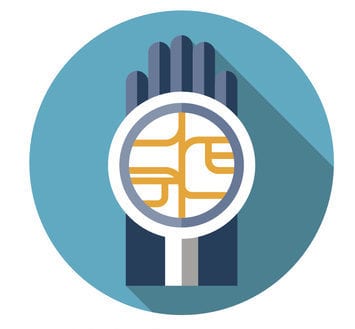Humanity Protocol (HP) has officially been announced as a direct competitor to Worldcoin. Like the latter, it is seeking to establish a blockchain-based digital identity platform rooted in biometrics. But instead of using iris scans to register users, as Worldcoin does, HP is relying on palmprint scans, which the startup describes as “a less invasive identity verification alternative”.

The startup has received backing from venture capital firms including Hashed, CMCC, Cypher Capital, Foresight Ventures, and Mechanism Capital. It will have some catching up to do, with Worldcoin reportedly having signed up nearly four million users—and the firm appears to be leaning on its biometric alternative to iris scans to get an edge.
In its introductory announcement, Humanity Protocol said that its palm-based user verification system “is easily accessible through smartphones,” suggesting it may leverage the imaging capabilities of a standard mobile device. That could offer one advantage over Worldcoin’s system, which relies on spherical “Orb” devices that require interested users to enrol in-person at specific locations.
“User-centric palm recognition, seamlessly integrated into the blockchain, ensures ease of use in daily activities, prioritizing optimal accessibility,” the company stated. “With simplicity at its core, this inclusive approach reinforces Humanity Protocol’s commitment to providing an intuitive and welcoming experience for individuals engaging with Web3 applications.”
Humanity Protocol launched in partnership with Animoca Brands and Polygon Labs.
Animoca Brands focuses on digital entertainment, blockchain, and gamification technologies, and is well-known for its involvement in the development and publishing of a wide range of digital products including mobile games, virtual worlds, and various digital assets and collectibles, often leveraging blockchain technology to enhance digital property rights and user engagement. The company plays a significant role in the growing ecosystem of decentralized gaming and NFTs (Non-Fungible Tokens).
Polygon Labs, commonly known just as “Polygon,” is the company behind the Polygon platform, a protocol and framework for building and connecting Ethereum-compatible blockchain networks. It aims to solve some of the major challenges faced by the Ethereum blockchain, such as high fees, poor user experience due to slow transaction speeds, and scalability issues, without sacrificing security.
Polygon’s architecture provides a multi-chain system, often described as an “Internet of Blockchains,” which allows for the creation of scalable, interconnected blockchain networks. This includes various scaling solutions such as Polygon PoS (Proof of Stake), Polygon SDK (Software Development Kit) for building Ethereum-compatible chains, and other technologies like zkRollups and Optimistic Rollups to enhance transaction efficiency and reduce costs.
By providing these solutions, Polygon enables developers to build scalable, user-friendly dApps (decentralized applications) with the security and liquidity of the Ethereum ecosystem, facilitating wider adoption of blockchain technology and the development of a more open and interoperable Web3 infrastructure.
By building on Polygon’s platform, Humanity Protocol can implement cutting-edge features like palm recognition technology and zero-knowledge proofs within a secure, Ethereum-compatible environment.
Sources: CryptoDaily, Medium
–
March 1, 2024 – by the Mobile ID World Editorial Team

Follow Us